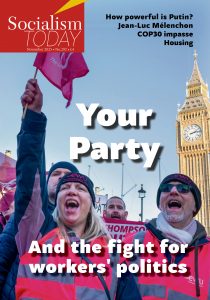In November Socialist Party members Lois Austin and Hannah Sell appeared before the SpyCops inquiry. In answering the Met Police ‘justifications’ for their undercover policing, important issues about how to fight the far-right were contested. HANNAH SELL writes.
In 2015 the then Tory home secretary, Theresa May, set up the Undercover Policing Inquiry, known as the SpyCops Inquiry, to investigate the activities of the Metropolitan Police’s Special Demonstration Squad, which ran from 1968 to 2008 and which had sent undercover officers into around 1,000 different organisations, all but a handful of them on the left. It took almost six years before the Inquiry began, and four years later it is still rumbling on.
Clearly its eventual conclusion will condemn some of the worst ‘excesses’ of the undercover officers. These include that a number of them had sexual relationships, including fathering children, while they were undercover, and that officers spied on the family of murdered teenager Stephen Lawrence and other bereaved families.
Read more